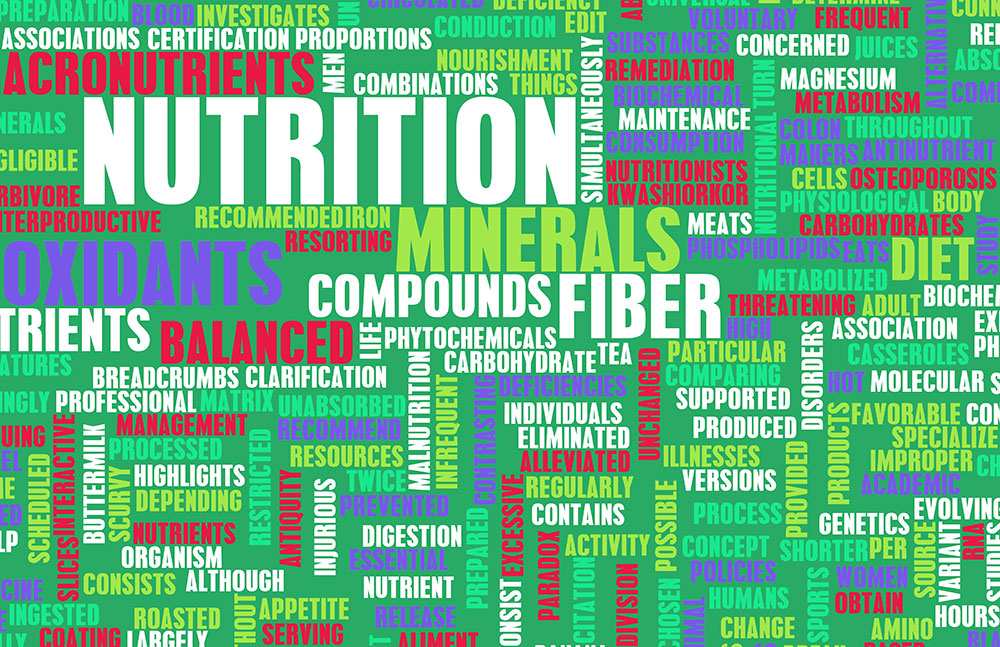Explore Your Educational Options
Evolving health care concerns are changing the way people think about nutrition. From increasing interest in production practices and food chain transparency to greater emphasis on healthful ingredients; public awareness has never been higher. To support good health, more and more people are benefiting from nutrition counseling. As interest grows, qualified professionals are in demand.
Nutritionists are the leading authorities on food and its impact on personal health, serving as integral players in comprehensive personal health care. In practice, nutrition professionals provide individualized care for clients, addressing various concerns. Contributing to the best possible health care outcomes, nutritionists evaluate eating habits, assist with meal planning, monitor progress and reinforce public health through education and nutrition and wellness research.
Dieticians and other nutrition professionals enter the field in several ways and practice in diverse settings. While some are self-employed, others work in hospitals and integrative care environments. If you want to become a nutritionist, you’ll need professional credentials in dietetics and nutrition, including an educational background in science. Specific qualifications vary, depending upon the area of the country in which you practice, but going to work as a nutritionist may require you to:
- Complete an accredited bachelor’s level education
- Participate in supervised practice, demonstrating proficiency
- Pass a national certification examination

Professionals Serve Vital Health Care Roles
Nutritionists promote general good health, serving as food experts in a range of medical and non-medical environments. Registered professionals may offer services through private practice, appealing to self-starting entrepreneurs. But employment is also available in hospitals, holistic health centers, homes, and long-term care facilities.
Services provided by nutritionists are highly individualized, so each treatment plan is unique. Some of the responsibilities shared by professional nutritionists, working in the field, include these activities:
- Assess – Monitoring food consumption habits yields vital clues for trained nutrition and dietetics professionals. Armed with expertise about the ways food impacts public health, a nutritionist uses information about a person’s eating habits to evaluate the nutritional value of his or her diet. The professional analysis illustrates how the available nutrient supply is impacting a client’s health. In particular, nutritionists specialize in the relationships between nutrition and metabolism, function, and disease.
- Advise – Nutritionists are schooled to offer healthful food alternatives. With the overall well-being of a patient in-mind, nutritionists and their assistants frequently help with individual menu-planning. By shaping food choices in this way, members of the profession serve in a preventative role, giving clients the knowledge and tools needed to stay healthy.
- In many cases, nutrition professionals work directly with clients suffering from chronic conditions or recovering from injuries. In this capacity, members of the profession assist rehabilitation and reinforce underlying good health. Dietary consultation is also beneficial when special menu requirements are present. Nutritionists are valuable partners for those facing conditions like diabetes, celiac disease, and chemotherapy side effects.
- Educate – One-on-one client relationships are common in the fields of dietetics and nutrition, but qualified professionals also educate in group settings. Employee wellness programs sponsored by forward-thinking organizations typically include a healthy eating component, articulated by a food expert. And nutritionists engage in vital community education, spreading knowledge and promoting public health.
Choosing Your Path to Academic Success
The term “nutritionist” is a general designation for those who assist with food and nutrition issues. The word itself doesn’t carry a credential, unless it is backed-up by a degree and certification. A number of states regulate the requirements for practicing as a “nutritionist”, but many territories have no such oversight. As a result, “nutritionists” fall across a wide range of qualifications and education.
There is more than one way to make entry into the growing field of nutrition and dietetics. To protect the public and establish consistent professional standards, important distinctions are made about education and practical experience in the field. Training as a Registered Dietician Nutritionist (RDN) is a bachelor’s degree level study track, comprised of coursework approved by the industry’s accrediting body. Nutrition and Dietetic Technician, Registered (NDTR) is another credential earned by professionals serving in the field. An NDTR acts as an assistant to an RDN in some settings, but also acts independently, promoting nutrition and food health education. If you are considering education in nutrition sciences, your best approach depends upon which certification you plan to seek.
Earning a registered dietitian nutritionist credential starts with an academic background heavy in physical and life sciences. Typical coursework for an RDN candidate includes science instruction in these areas:
- Sociology
- Biochemistry
- Microbiology
- Physiology
- Food Science
- Chemistry
As part of a comprehensive curriculum, nutritionists also study business and economics, and learn about food service management for a variety of settings. After completing a practical phase, consisting of internships and hands-on work in related environments, RDN candidates are ready to sit for the national exam.
Beyond completing undergraduate degree programs, many professionals add to their academic credentials, pursuing advanced degrees and certification. Master’s programs and specialty designations can lead to assignment as a Certified Nutrition Specialist (CNS). In addition to academic requirements, CNS candidates must also earn advanced experience and pass a certification exam.

Academic Programs
As you contemplate education options for becoming an RDN, it is important to remember program requirements and regional rules of practice vary. Before settling on a study track, it pays to make contact with schools you are interested in attending. Advisors from each institution can help with the particulars, guiding you to employment in this rewarding field. The following educators represent only a few of the esteemed degree programs available for nutritionists and dieticians:
The University of Arizona College of Agriculture and Life Sciences extends degree opportunities in nutritional sciences. Graduates who earn an RDN credential demonstrate they’ve completed these requirements:
- Complete an accredited didactic program in dietetics, emphasizing science, nutrition, and the health impacts of food.
- Log more than 1200 hours working in supervised internships. This practical requirement is met in clinics, foodservice environments, and community health settings.
- Pass a national certification exam
- Participate in continuing education to maintain the credential
Students enrolled in Arizona’s nutritional science programs are expected to maintain a GPA of at least 2.0 at all times, but a higher average is required to compete for internships and advanced study options. The school also puts-forth merit-based scholarships for high achievers.
The Department of Food Science and Human Nutrition at Michigan State University offers nationally recognized academic programs for would-be nutritionists. The college is also active in food science research, working to make a difference in food production and safety, among other things. The school’s forward-looking programs emphasize the relationship between food, health, and chronic diseases, educating the next generation of nutrition professionals.
MSU’s Bachelor of Science programs focus on three areas, giving undergraduates multiple options for earning academic credentials in the field:
- Dietetics
- Food Science
- Nutritional Sciences
Earning any of these undergraduate degrees prepares graduates for entry-level employment in the field. The esteemed programs are also preparatory for advanced nutrition education and post graduate designations. The dietetics program is accredited by ACEND, meeting the educational requirement for becoming a professionally qualified dietician. In addition to academics, program participants are encouraged to join the campus’s well-organized nutritional sciences clubs.
University of North Carolina at Chapel Hill educates prospective nutritionists and professional dieticians in its Gillings School of Global Public Health. The School’s Department of Nutrition prepares enrollees for wide-ranging careers in food and nutrition. The nationally recognized programs offered at UNC are immediately unique, in that the department straddles a school of public health and a school of medicine. Students and faculty are active in research, contributing at every level of food science and health management.
UNC credentials include broad offerings, ranging from Bachelor of Science in Public Health (BSPH) to Ph.D. opportunities for advanced study and research. The school puts forth a number of master’s degrees, including a Master of Science with Nutritional Biochemistry Concentration. Students interested in UNC’s nutrition program are invited to attend an information session, highlighting various academic and career tracks for nutrition professionals.
Demonstrating a commitment to food science and nutrition education, Texas A&M Agriculture and Life Sciences established a Department of Nutrition and Food Science in 2005. Nutritional science majors studying at A&M complete coursework exploring the relationships between food components, nutrients, and human health. The curriculum emphasizes biochemistry, immunology, physiology, genetics, microbiology and the interactions between physical systems. There are three study tracks to choose from. Would-be nutritionists may elect to complete A&M’s Didactic Program in Dietetics, before moving-on to the practical portion of their education. The Department’s General Nutrition track is also appropriate for gaining employment in wide-ranging roles, preparing graduates to work in public health, education, sports nutrition, and other specialties. Any nutrition program completed at Texas A&M provides strong background for further education in medicine, dentistry, pharmacology and other professional health care disciplines.
Texas A&M’s advanced learning opportunities include master’s degrees in food science and nutrition. One forward-looking program, a dual master’s option in kinesiology and nutrition, represents a unique chance to simultaneously earn credentials in these related disciplines. The school’s active research role also supports several doctoral programs.

The School of Exercise and Nutritional Sciences at San Diego State University puts-forth three undergraduate programs of interest to would-be nutritionists. With BS tracks available in kinesiology, athletic training, and food and nutrition, programs assist career development in a range of related positions.
SDSU’s Bachelor of Science in Foods and Nutrition explores the food supply and its impact on personal health. Built on a core of scientific prerequisites, the curriculum also incorporates social and behavioral sciences, creating a comprehensive learning experience. Intensive focus is given to these areas:
- Food safety and quality
- Disease prevention
- Food composition
- Metabolism and nutrients
- Exercise and fitness
- Dietary therapy
- Food service management and organization
- Community nutrition issues
Students preparing to secure RDN credentials have a leg-up, using SDSU’s Didactic Program in Dietetics (DPD) to satisfy the educational requirement. The program is the first step toward certification, giving graduates the tools and experience needed to apply for internships. Upon completion of the DPD and practical requirements outlined by the accrediting body, achieving a satisfactory score on the national registration exam is the final hurdle leading to designation as an RDN.
Career Advocacy for Nutrition Professionals
Commission on Dietetic Registration (CDR) is the agency responsible for administering individual credentials in the field of nutrition and dietetics. The group establishes the standards a candidate must meet before sitting for entry-level examinations in the field. If you have questions about eligibility, particularly under special circumstances, CDR is the authority governing areas such as international equivalency, registration eligibility reciprocity and other credentialing concerns. Prospective RDN and NDTR candidates are encouraged to explore various approved paths to earning credentials.
Maintaining membership above 100,000 individuals, the Academy of Nutrition and Dietetics (AND) is the largest organization of nutrition and dietetic professionals in the world. Originally founded in 1917 by a group of concerned citizens, the group’s reach has expanded worldwide and its mission grown in scope. Conserving food resources and improving public health were among the visionary founders’ early goals, and the Academy now reinforces its public health contributions with additional activities benefitting members. The Academy actively promotes nutrition and dietetics professions in a number of important areas, such as advocacy, education, and research.
Comprised of the leading experts in the field, the Academy plays an important role shaping public policy. Not only are members called upon to testify in various settings, but the group also lobbies for the interests of nutritionists and dieticians. Respected input to the profession is offered in the form of detailed position papers put-forth by the group, addressing pressing concerns in the field.
The accrediting branch of the Academy is called the Accreditation Council for Education in Nutrition and Dietetics (ACEND). Furnishing educational oversight, the organization is responsible for validating programs and coursework offered in dietetics and nutrition education. The Council’s dual function protects the public as well as students seeking to work as registered dietician nutritionists and nutrition and dietetics technicians, registered.
The National Association of Nutrition Professionals (NANP) is a professional business association dedicated to advancing standards within the holistic nutrition industry. The group endorses schools meeting its high educational standards, guiding professionals to comprehensive holistic health education. In addition to the well-rounded exposure provided by recognized study tracks, completing an approved program also prepares participants to sit for the Board Examination in Holistic Nutrition.
Job Prospects for Nutrition and Dietetics Professionals
The positions of RDN and dietetic technician serve vital roles in the modern health care system. The growing vocation puts people to work in diverse settings and offers several specialties for working within the profession. Credentialed nutritionists and NDTRs are employed in medical and non-medical environments, serving clients of all ages. Employment in the field includes but is not limited to the following opportunities:
- Hospitals
- Self-employment
- Clinics
- Long-term care facilities
- Food service organizations
- Universities
- In-home health care
- Public-sector agencies
- Private corporations
- Research facilities
- Anywhere professional nutrition counseling is required.
According to the Bureau of Labor Statistics, dietary technicians earned a median annual income of around $30,000 in 2015. Technicians practicing in major metro areas, LA and New York City earned significantly more than their counterparts around the country.

When evaluating salary levels and career prospects for nutritionists, it is important to recognize distinctions between the education and experience levels of practitioners. Earning an RDN credential represents a bachelor’s level education in dietetics and nutrition, followed by extensive practical internships. RDN candidates must also pass a registration exam in order to secure this credential. Professionals offering nutrition counseling and advising clients about healthy food choices may indeed be called “nutritionists”, but registered, state-licensed practitioners are among the highest earners.
Many states maintain licensing requirements mirroring those needed to earn an RDN credential. As a result, following this study path can be the fastest route to serving in a state-licensed capacity. Median annually earnings for U.S. dieticians and nutritionists in 2015 were more than $57,000 each. For those working in outpatient care facilities, the number topped-out above $62,000 annually. And the top ten-percent of working nutritionists earned more than $80,000 each in 2015.
The role of food and nutrition on individual health has fallen under greater scrutiny in recent years, reinforcing demand for professional dieticians and nutritionists. As a result, job growth forecasts for professional nutrition fields exceed the national average encompassing all types of employment.
The preventative value of nutrition consultation, in particular, continues to spur growth in the profession. The uptick can also be partially attributed to an aging group of baby boomers, requiring more medical care than their younger counterparts. Statistically, nutrition and dietetics employment opportunities are expected to increase by 16% between 2014 and 2024.
Whether you choose to enter the field of nutrition as a technician or a medical specialist, career prospects are robust. Becoming an RDN furnishes flexible employment opportunities and because the field is expected to expand, job security is also strong. The particulars vary across state licensing authorities, so in addition to selecting your desired qualification, your path to employment must account for local regulations.
For the best results earning RDN and NDTR certification, consult with industry representatives and agencies familiar with licensing requirements. Their recommendations will guide you to recognized educators and streamline the credentialing process. Equipped with a first-class education and internship experience, you’ll be well on your way to a rewarding career as a nutritionist.
